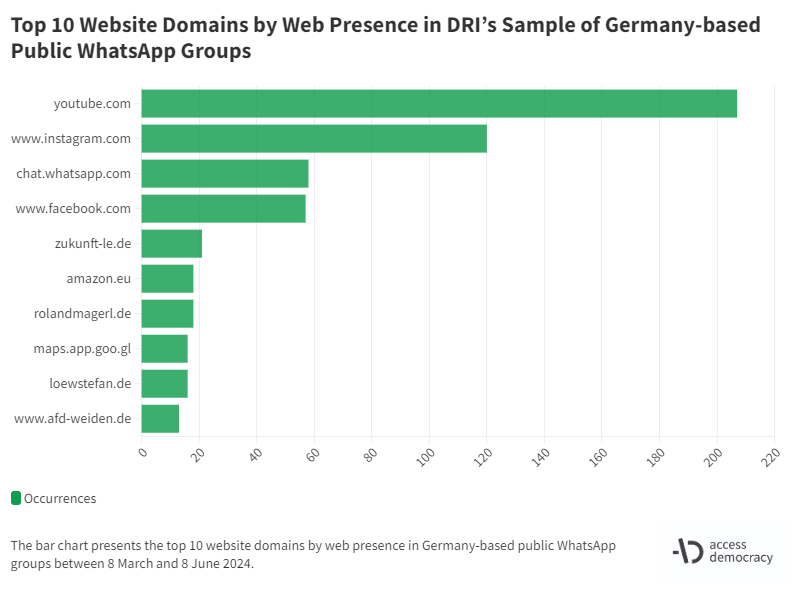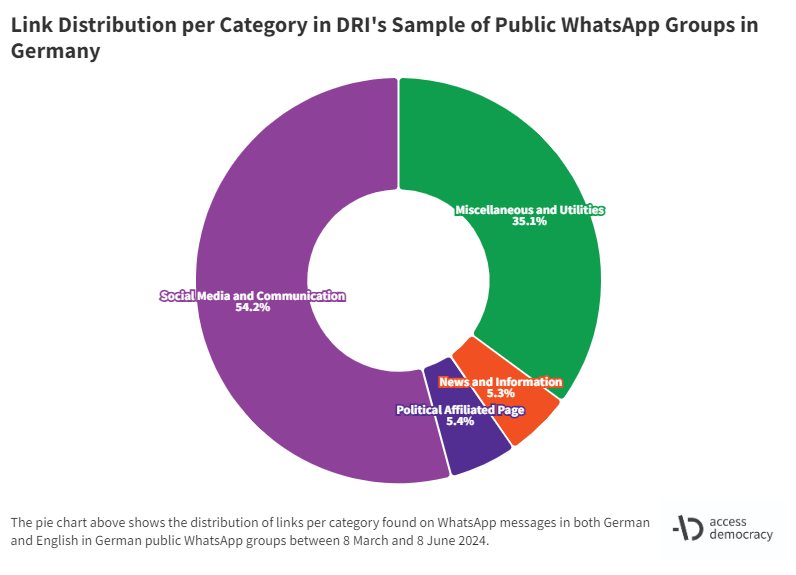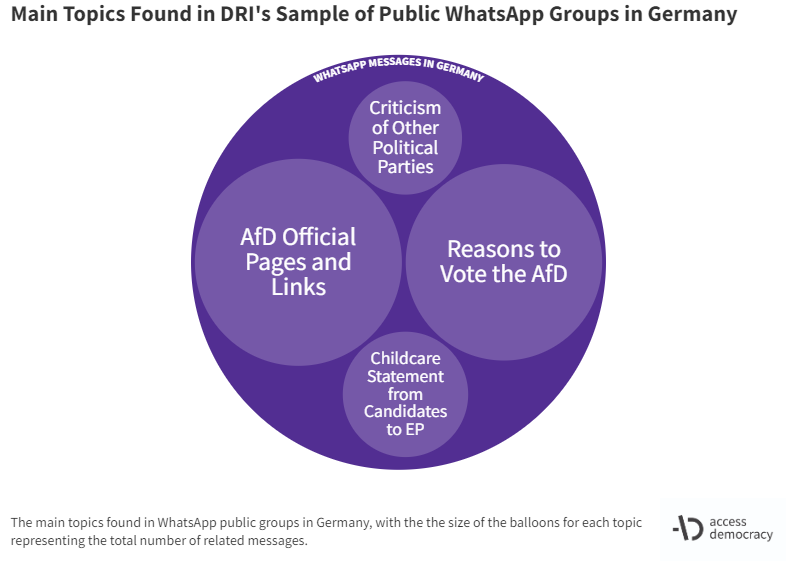Executive Summary
Citizens of EU Member States went to the polls from 6 to 9 June 2024 to elect their representatives in the European Parliament (EP). In this brief analysis, we look at the related messaging on a platform that is rarely the focus of research – public WhatsApp groups. We analysed these groups in Germany, focusing on the most relevant URLs shared in the messages and the topics involving political messaging.
Many WhatsApp groups are public in character. They can have up to 1, 024 members, they can be found through searches (rather than personal invitation), and they can be joined without invitation or special checks by administrators. In other words, anybody can join them; administrators cannot be sure who reads them.
Unlike with classical social media, however, Meta does not provide ways to research public WhatsApp groups. This, therefore, created significant methodological limitations for this study. While the method of identifying relevant public WhatsApp groups for study strives to ensure a level of representativeness (see below), we do not claim that the findings are statistically representative of all public WhatsApp groups in Germany. We observed some data bias – for example most groups appear to be hosted in Bavaria.
Key Findings
- In the 334 public WhatsApp groups analysed in Germany, the most recurrent URLs were links to other social media and digital platforms, accounting for 54.2 per cent of all links. Notably, politically affiliated pages and news and information websites were also featured, albeit to a lesser extent – 5.3 per cent. This highlights the use of cross-platform sharing to increase reach and reinforce political narratives.
- When analysing the most-often recurring links shared on public WhatsApp groups, we identified a significant emphasis on security, the role of immigrants in crime, and the political narratives around these issues.
- Within our sample, we found four main themes in messages about political topics: AfD official pages and links, reasons to vote for AfD, childcare statements from candidates, and criticism of other political parties. Most messages positioned AfD as a solution to current societal problems, suggesting a broader strategy to appeal to voters concerned with safety and national security.
Methodology
For this brief, DRI partnered with Palver, a social listening company that monitors public WhatsApp groups in various countries. The researchers had access to the platform where, through a dashboard, we could monitor various data metrics, such as the volume of messages containing chosen keywords along a timeframe, unique chat IDs, texts of the message, and the date and time when the messages were sent. The data collected through Palver consists of messages from public group conversations on WhatsApp.
First, to detect invitation links to public WhatsApp groups, Palver follows three strategies: 1) searching for links indexed by online search engines (Yahoo, Google, Bing, and DuckDuckGo); 2) searching for links shared on public Facebook groups; and 3) retrieving links found in WhatsApp groups that Palver has already monitored. For the first two strategies for detecting invitations, they use a list of chosen terms that serve as inputs for searches. The list of terms includes relevant words for the German political context, such as the names of political parties, and keywords such as “elections”, “EU Wahl”, “economy”, and “infrastructure”. In the case of search engines, there are myriad techniques used to maximise the identification of links of interest, including the use of filters by region, country, language, and website.
When searching for links shared on Facebook, Palver uses the basket of terms in two ways: 1) the terms are used to search for public Facebook groups, in which a subsequent search is made for links to WhatsApp groups; and 2) the terms are used via the more general Facebook search, which brings up posts with links to WhatsApp groups. To narrow down the results obtained from these two approaches, Palver then looks for invitations sent from German telephone numbers, along with other approaches to determine the relevance of the identified groups.
These invitation links were used to join public WhatsApp groups, from which messages and meta data were then collected. For this brief, Palver joined 354 groups based in Germany. The data extraction strategy follows a similar methodology to that proposed by Melo et al. (2021) and Resende et al. (2018), and complies with European privacy law – the General Data Protection Regulation (GDPR) – as no user personal data is stored.
With this sample of groups, we collected 13, 057 WhatsApp messages posted in Germany-based public WhatsApp groups from 8 March to 8 June 2024. To perform the analysis, we focused only on messages written in German or English, as these are the languages most spoken in the country. After filtering for these languages, we obtained 6, 622 messages over the mentioned timeline. The rest of the dataset consisted of 3, 495 messages with a different format than text, such as images, videos, and audio, and 2, 941 messages in other languages. It is important to note that, as studying WhatsApp is not a common practice, due to the lack of data access, there were many challenges in understanding the representativeness of the sample. Since Meta does not provide enough information on the universe of public WhatsApp groups per country, while performing the analysis, we understood that our sample was not representative of Germany, but was highly focused on Bavarian content. This analysis is still relevant, however, to understanding the type of content shared on public WhatsApp groups, understanding conversations among a subset of the German population, and advocating for more transparency and data access.
Most-Often Shared URLs in WhatsApp Messages
One key aspect of WhatsApp messages is understanding which links are shared on the platform. As previously shown by DRI, cross-platform sharing on WhatsApp is a popular strategy to increase the reach of a piece of content. These links can take users to deceptive content or create echo chambers within the platform. For this reason, Meta introduced a limit on forwarding messages, so as to reduce their virality, as presented in recent transparency reports. In addition, WhatsApp has Messaging Guidelines to mitigate the spread of illegal or harmful content shared on the platform. At the time of writing, however, Meta did not publish reports on the DSA transparency database on the occurrences of illegal and harmful content or the effectiveness of these guidelines. Moreover, with Meta launching new features on WhatsApp, such as Channels, the problem of a lack of election and community guidelines has become more pronounced. In this sense, exploring the content shared in public groups is imperative, especially when looking at URLs and their domains. To perform this analysis, we extracted all the links and domains in the messages, and performed a qualitative categorisation, based on their content.
When analysing all the links and domains, we identified four relevant categories:
|
Category |
Description |
|
Social Media and Communication Platforms |
This category includes websites and services primarily used for social networking, communication, and content sharing among users. Examples include YouTube, Instagram, TikTok, Telegram, Facebook, and X. |
|
Political Affiliated Page |
This category includes websites from politicians and political parties. Examples include the websites of the far-right Alternative for Germany (Alternative für Deutschland, AfD) party and the centre-left Social Democratic Party of Germany (Sozialdemokratische Partei Deutschlands, SPD), as well as the pages of politicians |
|
News and Information |
This category includes news websites (of various quality). Examples include those of the newspapers Bild, FAZ, and SZ, and of public broadcasters SWR and ZDF. |
|
Miscellaneous and Utilities |
This category encompasses a wide range of websites that provide various online tools, professional development websites, and e-commerce and shopping pages. Examples include Google Maps, Amazon, and Temu. |
When analysing the German subset of messages in both German and English, we found 926 unique URLs, which were shared over 1, 500 times in total. The graph below displays the most-often recurring domains among these URLs.

Within the timeframe for our analysis, URLs from “Social Media and Communication Platforms” had the highest number of occurrences. A qualitative analysis of the content posted on YouTube, the social media platform with the most-often recurring links shared on WhatsApp, revealed that the videos varied from tutorials to entertainment, lifestyle, news, and religion. Nine links were unavailable from these videos, and 29 videos were in the “shorts” format.
AfD is the only political party that appears among the videos from YouTube found in the sample with two videos. The first is from a verified channel called AfD TV (with 270, 000 subscribers), entitled “AfD Europawahlprogramm in 100 Sekunden” (AfD European election programme in 100 seconds). The video had 526, 000 views and more than 2, 600 comments at the time of writing. The second video was from a smaller, local AfD channel from Weiden, called AfD Weiden i. d. OPf., with the video “Noch nie war die Kriminalität durch Zuwanderer in Bayern so hoch wie 2023!” (Crime caused by immigrants in Bavaria has never been as high as in 2023!), with 59 views and no comments at the time of writing.
It is interesting to point out that three domains from political affiliated pages are present in the top ten — two AfD politicians, Roland Magerl and Stefan Loew, and the AfD political page for the city of Weiden. The graph below presents the distribution of domains per category defined for this report, allowing for a more in-depth analysis of the domain categories.

The most prominent category, “Social Media and Communication”, accounted for most links, at 54.2 per cent of the total distribution. This share highlights the dominant role of cross-platform sharing, emphasising WhatsApp’s role as a key platform for content distribution.
The “News and Information” and “Political Affiliated Pages” categories were relatively small, representing 5.3 per cent and 5.4 per cent of the total links, respectively. While one might expect higher sharing rates for news and politically oriented content, due to their importance in societal discourse, the data showed otherwise. This limited representation might reflect the challenges associated with gathering a representative sample from WhatsApp data, as Meta doesn’t provide access to data in a structured manner or provide precise information about the universe of public groups and members for research purposes.
When analysing the data qualitatively, in the “News and Information” category we found that Bild and ZDF were the most-shared news portals. When analysing the links shared from these news portals, we found politically contentious content. All of the content shared below comes from the same AfD-affiliated group mentioned above in the analysis, “AfD Weiden—Neustadt—Tirschenreuth”.
Relevant Content from Bild.de
The links and messages that shared links to Bild primarily focused on issues related to security, crime, and political discourse in Germany. They highlight several key incidents and viewpoints, particularly from the perspective of the AfD and its supporters. One significant topic discussed was the presence of Islamic State (IS) supporters in Germany and, specifically, the case of an IS sympathiser in Tirschenreuth, who cannot be deported to Syria, due to the danger he would face there, but who is also not allowed to leave the town, due to being a security risk. This situation has sparked criticism related to national security and the handling of individuals deemed dangerous, with AfD supporters suggesting that, if elected, the party would introduce stricter deportation policies.
Relevant Content from ZDF
The messages in which shared links from ZDF focused on criticism of the current coalition in Germany. One example covered CSU leader Markus Söder’s strong criticism of the current German coalition government, known as the “Traffic Light” (Ampel) coalition, for the red, green, and yellow colours of its member parties. During the CSU European Party Congress, Söder criticised the coalition for its left-leaning policies, and accused it of neglecting Bavaria. He focused his attacks particularly on the Greens, highlighting issues such as economic management and migration policies. Söder emphasised the need for the CSU to oppose the coalition’s initiatives, and positioned his party as a defender of conservative values and regional interests.
Discussion of Political Themes
For this analysis, we created a list of keywords to build a lexicon of words related to the EP in the German context. The dictionary contains general terms of reference to the EP elections, electoral process keywords, party names, and all candidates’ names in the parliament from Germany. The list has 1, 459 keywords. After filtering our German subset, we performed a topic modelling analysis of the entire subset. The topic modelling used in this section is a data analysis technique that allows us to identify and extract significant topics from a large set of unstructured data, such as posts on social media. With a pre-trained model, it is possible to calculate the probability that each word belongs to each topic. Thus, we can understand which posts can be grouped together, as well as how they are distributed and related.
The graph below visually represents the primary topics discussed in WhatsApp public groups in Germany, mostly related to the AfD. The topics are categorised into four main areas: AfD official pages and links, reasons to vote for the AfD, childcare statements from candidates, and criticism of other political parties.

AfD Official Pages and Links
The category “AfD Official Pages and Links” encompasses messages that direct users to official AfD resources, including links to local AfD representations, plenaries, and events. The prominence of this category suggests a concerted effort by the party to disseminate official information and maintain a strong online presence. When analysing specific messages, however, we found messages that suggested the party was under massive attack. It is interesting to note that the YouTube link provided in this message was no longer unavailable at the time of writing.
Reasons to Vote for the AfD
The “Reasons to Vote for AfD” category was the largest, and included highly politicised content to persuade group members to support the AfD. Messages in this category highlighted security concerns, alleging that crime has increased in Germany due to an increased presence of foreign nationals. These messages also emphasised that no other party represents the interests of Germany and its citizens as effectively as the AfD.
For example, one message discussed the Bavarian interior minister’s claim that foreigners are responsible for the rise in criminal offences in Germany. The message criticises the “double standards” in public discourse, saying that such statements from the AfD are labelled as hate speech, while the same language from government officials is considered straight-forward.
Criticism of Other Political Parties
The “Criticism of Other Political Parties” category contained messages criticising other parties from the AfD’s perspective. These messages argued that the Traffic Light coalition is ineffective, accused the Greens of wanting to keep borders open, and claimed that the SPD aims to establish socialism in Germany.
Childcare Statements from Candidates
Lastly, the “Childcare Statements from Candidates” category included messages sourced from a specific group of parents in the town Leinfelden-Echterdingen. This category includes statements from various candidates on improving the local childcare system, covering proposals from all political parties.
